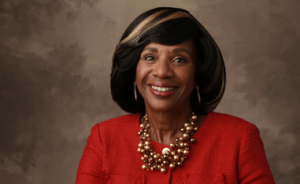(Akiit.com) Change begins with a vision for the future. Paulette Brown’s vision is to build a more just and inclusive society. Within her role as the President of the American Bar Association (ABA), she has worked to advance this vision with the support of fellow attorneys from across the globe. In partnership with nearly 400,000 lawyers, Ms. Brown is transforming the public perception of lawyers from a ‘hired gun’ who simply focuses on billable hours to the lawyer who serves as a leader by creating access to justice.
Lawyer as Leader
The role of the lawyer as leader is set forth in the ABA Model Rules of Professional Conduct. The preamble states: “As a public citizen, a lawyer should seek improvement of the law, access to the legal system, the administration of justice and the quality of service rendered by the legal profession.” This is a call to leadership rooted in the ethics of justice, fairness, and equity. This is the type of leadership needed to advance equal justice under law.
“A leader is someone who is self-directed and does not allow anyone to place barriers,” Brown stated. Lawyers are uniquely positioned to pick up the mantle of leadership. Legal training provides key tools for making an impact. The culmination of traditional lawyering skills, critical thinking, oral advocacy, analytical skills, and effective writing, equips lawyers with the versatile toolbox needed to make a lasting impact in the administration of justice and policy development.
allow anyone to place barriers,” Brown stated. Lawyers are uniquely positioned to pick up the mantle of leadership. Legal training provides key tools for making an impact. The culmination of traditional lawyering skills, critical thinking, oral advocacy, analytical skills, and effective writing, equips lawyers with the versatile toolbox needed to make a lasting impact in the administration of justice and policy development.
Brown also expresses the necessity of leaders knowing the importance of trusting and delegating to others. This is the foundation of leadership legacy as one paves the way for future leaders who cultivate the power, which necessitates societal reform. This is a recognition that lawyers do not work alone in isolation but instead build strategic partnerships in order to advance social justice for generations to come.
Brown’s leadership style is modeled after the many women leaders who came before her and created new inroads to justice and freedom. Her leadership style was influenced by her mother, Madeline Albright (former United States Secretary of State), Rosa Parks (civil rights pioneer), and Fannie Lou Hamer (political leader). Each of these women embodied the courage, faith, and tenacity required to lead social change and initiate strategic action for eradicating injustice. According to Brown, these women leaders compelled her to become an advocate and leverage her influence in powerful ways. She warns: “you can’t participate at the sideline but need a seat at the table.” Brown has strategically taken a seat at the table through her service in the ABA House of Delegates and National Bar Association.
Although influenced by powerful women leaders, she reminds emerging leaders to also find their own authentic voice and forge a pathway to new terrains. Brown stated, “Take pieces from different people, not emulate but “be yourself.” At the core of being herself, Brown has discovered how to use her voice and position to lead change in practical ways.
The Value-Added of Diversity and Inclusion
With an eye toward the future, Paulette Brown has embraced the changing cultural landscape as an opportunity to promote diversity and inclusion. The changes are reflected in data which shows by 2050 America will no longer have a racial majority. Despite these changes, the practice of law is one of the least racially diverse professions. Eighty-eight percent of lawyers are white. This homogenous cultural representation diminishes the creativity and innovation which is derived from diversity. Studies have shown diversity fosters an environment where creative problem solving can occur which challenges the status quo and moves beyond uniformity in thought processes. Brown reminds us that “leaders who are interested in diversity are forward thinking.” These leaders can see the power of bringing together teams who can think critically, unleash their imagination, and develop solutions (for both legal and societal challenges). This is a results-oriented approach.
Addressing Bias in the Legal System
Brown has raised awareness about the effects of bias in the legal system. Although the perception of the administration of justice is related to it being bias-free and evaluated in an objective manner, implicit bias is often at play. Brown is educating the legal community about the reality of unconscious bias and its pervasive nature. We all have biases and they can impact our judgment. Brown’s latest project, a short video on implicit bias among judges, serves as a valuable tool for addressing bias.
The ABA is the official voice for lawyers. Paulette Brown is lifting her voice to mobilize other lawyers to create a full chorus of change agents. Some of these efforts include: ABA lawyers assisting President Obama with policy changes related to clemency, providing legal services to veterans and kids in need of defense (KIND), and supporting efforts to address the homelessness crisis. In the interest of leveraging the service component of true leadership, Brown has also challenged lawyers to take on one small action to make a difference in the world by committing one hour per week to providing probono legal services. Brown admonishes lawyers to never forget “a law degree is more than just a piece of paper. It is power.” It is the type of power needed to make ‘and justice for all’ a lived reality.
Written by Dr. Artika Tyner (University of St. Thomas)









Leave a Reply